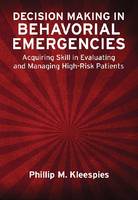(To see other currencies, click on price)
MORE ABOUT THIS BOOK
Main description:
When a client or patient presents who is suicidal, potentially violent, and/or at risk of being victimized, this is considered a behavioural emergency, a situation that requires immediate response. The goal of this book is to help clinicians increase their ability to manage stress and decrease its negative impact when making decisions about the assessment and care of these patients.
The author presents models for decision making and stress training, guidance for teaching how to evaluate and manage behavioural emergencies, decision support tools, and a discussion of legal and ethical considerations. This very practical approach to required competency will be a valuable resource for psychologists and any other mental health professionals who work in a clinical setting. It is the only known work that advocates for a decision-making model appropriate to the circumstances in which behavioural emergencies often occur.
Contents:
Preface
Acknowledgments
Introduction
Evaluating and Managing Behavioral Emergencies and Crises: An Overview
Decision Making Under Stress: Theoretical and Empirical Bases
Training to Reduce Stress in Dealing With Behavioral Emergencies
Mental Practice for Decision Making During Behavioral Emergencies
The Use of Decision-Support Tools in Behavioral Emergencies
Training for Decision Making With Experience Near or Actual Behavioral Emergencies
The Stress of Legal and Ethical Issues in High-Risk Cases
Coping With the Emotional Aftermath of Negative Events
Afterword
References
Index
About the Author
PRODUCT DETAILS
Publisher: Eurospan (American Psychological Association)
Publication date: January, 2014
Pages: 240
Weight: 652g
Availability: Available
Subcategories: Psychotherapy

